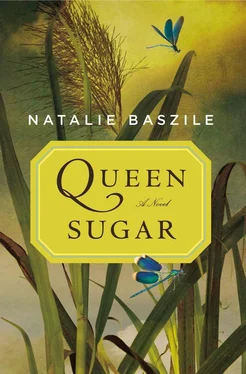A convoy of trucks and tractors hauling cane stretched a quarter mile down the road, and Charley, strapped into the passenger seat of the bull-nose semi, smelled burning sugar even through the closed windows. She rolled hers down and inhaled deeply, not caring that she drew some of the white ash falling like fine snow into her lungs. She had dreamed of this day, this moment. For the first time she saw the true connection, saw the chainlike links of iron between herself, her father, and grandmother, and their fathers’ fathers before that. She was bound to this place, this small patch of earth; it was she and she was it. She thought of Ernest, who must have died praying — believing, crazily — that his daughter could do this. She thought of Micah, at school, where the scent of burning sugar must be seeping into every classroom. She even thought of Norbert Rillieux, son of a white plantation owner and free woman of color, who turned sugar processing on its head when he invented the muliple-effect evaporation system. Charley turned to the driver, a middle-aged black man whose nickname was Mule. His dark face was a map of scars and pockmarks. He hadn’t said more than two sentences for the entire ride — out of respect, Charley guessed; after all, she was the boss. Charley didn’t care. As he shifted gears and the truck inched forward, she put her hand right on top of his.
Mule looked startled.
“It’s okay,” Charley said. “I just wanted to say thank you.”
“We got trouble.”
Charley’s boots had barely touched the ground. “What happened?” she asked, but thought she knew.
“Your brother. The men won’t work with him.” Denton pulled her aside. “He got angry. Thought the men were making fun of him; thought they were working fast on purpose, stepping up the pace to embarrass him.”
“I told him Romero’s team works fast.”
“I’m not done. He didn’t like that the men spoke Spanish. Thought they were talking behind his back. Or, I guess you could say, way out in front of him.”
“Where is he?”
“Hold on. Somehow, he found out what everyone’s making; that he’s making less.”
“Well, of course he’s making less!” Charley shouted. And just like that, she was back in Miss Honey’s kitchen, standing there like a stooge while Miss Honey shoved Ralph Angel down her throat. If she could, she would call Miss Honey right now and scream, You’re killing my farm! “Damnit. I knew this was going to — This is exactly what I—”
“Easy there, killer,” Denton said, raising his hands. “Calm down.”
“I am calm. But I can’t fire his ass without my grandmother throwing me out.”
“I broke up a couple of fights while you were gone. I was going to suggest you talk to him, but maybe I should be the one.”
If only getting rid of her brother were as easy as handing him off to Denton. “That’s all right. I’ll handle it.”
• • •
To Charley’s relief, Romero and his men were hard at work across the field, pulling cane from a freshly loaded wagon. Charley scanned the field for Ralph Angel and saw him camped out in a small patch of weeds and low shrubs. His sweat jacket was off, draped between the branches to form a crude shelter.
“What’s the problem?” Charley stood over him, her shadow canted out to one side.
Ralph Angel squinted up at her. “Where do I start?”
“I need you to do your job, Ralph Angel. That’s all I ask.”
“Job? Don’t you mean slave labor?”
“I’m on a deadline here.”
“You pay them twice as much as me.” Ralph Angel broke a cane stalk in half, then turned his gaze out toward the fields. Romero’s men were approaching the end of a nearby row. He cupped his hands and yelled, “Speak English! Comprende? ”
Thank God the tractor was so loud his voice didn’t carry. “I pay for experience,” Charley said. “You’ve got two hours of it counting the fights you started. They’ve got years.”
“Yeah, but I’m an—”
“Engineering major. I know.”
Ralph Angel looked at up Charley and she was surprised to see a wounded expression soften his face. He glanced down at his hands and stared. “Come on, sis. It might not seem like it, but I’m trying. This isn’t easy for me, you know? I’m not young like those other guys. I’m struggling just to keep up.” He cleared his throat. “If I can’t do this—” Then he looked away, wiping his nose on his sleeve. “I’m dying out there.”
Charley felt an ache of guilt deep in her chest as she looked down at her brother, who seemed older than she’d ever noticed before. Another place, another time, she could afford to handle the situation differently. But when she looked across the field, she saw that the tractor had made the turn and was starting down a new row. The clock was ticking. The cane would not wait. She turned back to Ralph Angel. “I’m sorry. And I hear you. But right now, the only thing that counts is how fast you plant.”
Ralph Angel leaned back stiffly. “Well, listen to you, Miss ACLU, Miss Equal Opportunity.”
“Are you going to work or are you going home? You call it, Ralph Angel.”
Ralph Angel glared at Charley, and she thought he’d say he was quitting. Instead he rose and crammed his arms through his jacket sleeves, hobbled off toward Romero’s crew.
But Charley took Ralph Angel off the planting crew just to be safe. She radioed Alison — a bad idea, she knew, but she couldn’t think of anywhere else to put him — and pulled Denton’s truck up to Alison’s combine in the middle of the field. Unlike the combine Charley drove, Alison operated an old-fashioned soldier harvester, which looked like a garbage can on rollers. No metal scrolls or vacuum chutes to suck, cut up, and spit out neat billets. Instead, the soldier harvester moved through the field like a pair of cutting shears, clipping stalks at ground level and laying them side by side across the row.
Charley handed Ralph Angel a cane knife. “All you have to do is follow behind the harvester and cut the cane he misses.” Scrapping cane was the most menial, most mind-numbing of all jobs; it required no skill. In the old days, it was the job reserved for women and children.
“Jesus, Charley. A man has his pride.”
“Take it or leave it.”
“Yeah, yeah, yeah,” Ralph Angel said darkly, and slammed the truck door.
But pairing Alison and Ralph Angel was like throwing water on a grease fire. In less than an hour, Charley’s walkie-talkie crackled again.
“What the hell were you thinking ?” Alison’s voice was a lightning strike, and by the time Charley made it to the front where she’d dropped off Ralph Angel, Alison had called her twice more.
“Sorry, Miss Bordelon, but I can’t work like this,” Alison said, stomping over freshly cut cane. “He’s impossible. I told him to swing the cane knife closer to the ground, but he won’t listen.”
“Me?” said Ralph Angel. “All I was trying to say was that maybe if you adjusted the blade, you’d cut more cane to begin with.”
“All right, that’s enough!” Charley yelled. “Ralph Angel, you’re out of line.” They started up again and she stepped between them. “Hey!” she shouted. “Cut it out. Alison, please, go to lunch.” She dragged Ralph Angel away from the combine. “Are you trying to cause trouble? Is that your plan?”
“It wasn’t me,” Ralph Angel said. “That guy’s a whack job.”
“Because I’m warning you. This is strike four by my count.”
“It wasn’t my—”
Charley raised her hand. “After lunch, you’re going back to the office. You’ll sweep the floors or shovel dog shit for all I care. I swear to God, Ralph Angel, this is your last chance.”
Читать дальше












